A*到来,点亮未来。A Level国际考即将进行,是时候要获得更多的A*了。
在A Level考试中,一些方法和建议Tips💡可以帮助你获得更多A*🌟,比如说做好计划🗓️、认真阅读题目📖、复习时考同学💬。
在这篇文章中,我将分享我的A Level考试建议💡,以及我的时间管理和规划机制🗓️,现在开始吧!
注:本文章主要针对剑桥国际(CAIE) AS和A Level,不同考试局的课程大纲或知识点可能会有所不同。
A Level考试中的常见错误
首先,我根据自己的经验,分析🔍并总结了我选择的学科考试中可能会经常出现的错误⚠️。
数学 (9709)
- 忘记保留合适的有效数字s.f.或小数位d.p.(除了题目中特殊要求外,通常是3 s.f.;但以角度为单位的度数是1 d.p.)
- 三角函数中的解超出题目所给的范围 (比如 0° ≤ x ≤ 360°, 0 ≤ x ≤ 2π )
- 求坐标coordinates时,忘记写出y坐标
物理 (9702)
- 忘记保留合适的有效数字s.f. (通常是≥ 2 s.f.)(比如说把6 A改为6.0 A)
- 在A Level物理考试中,使用g = 10 m s-2作为重力加速度,它应该是g = 9.81 m s-2。不要跟数学9709力学Mechanics的弄混哦!
计算机 (9618, 9608)
- 打开文件后,忘记用 CLOSEFILE 关闭文件
- 忘记写 ENDPROCEDURE 或 ENDFUNCTION 结尾
- 错误使用pre-condition ( WHILE )和 post-condition ( REPEAT )循环
- 在Trace Table中忘记给字符CHAR或字符串STRING加引号( ' 或 " )
- 伪代码调用过程Procedure时忘记加 CALL
- 忘记初始化变量(比如说设置为0)
- 忘记用 DECLARE 定义变量,特别是 FOR 循环中的 Count 变量,比如说
我的A Level考试建议
1. 认真阅读每一道题
部分题目(特别是选择题MCQ☑️)会设置一些“陷阱选项”⚠️。
当我在刷题的过程中,我还研究🔬过选择题中错误❌选项所具有的迷惑性(陷阱🗑️)。
即使出现以下情况,你仍然可以选择到一个(错误的)选项❎:
- 忘记乘以或除以2(如动能KE中的½mv2)
- 忘记平方或开平方
- 忘记转换单位(如cm转换为m📏)
- 把x轴和y轴看反(如白炽灯和发光二极管的V-I或I-V图像📈)
- 解题解到一半,得到中间值
- 忘记阅读所有题目信息
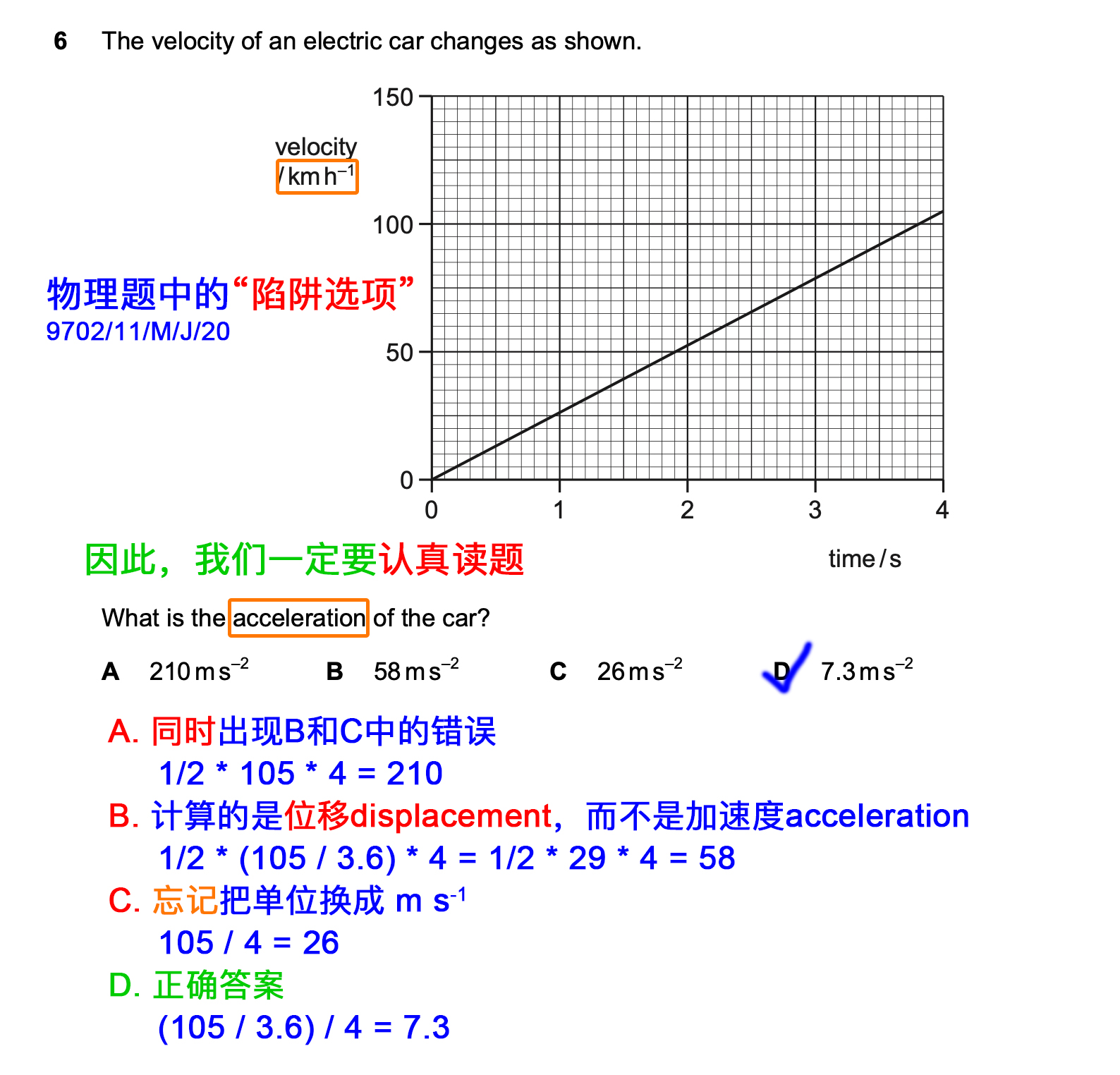
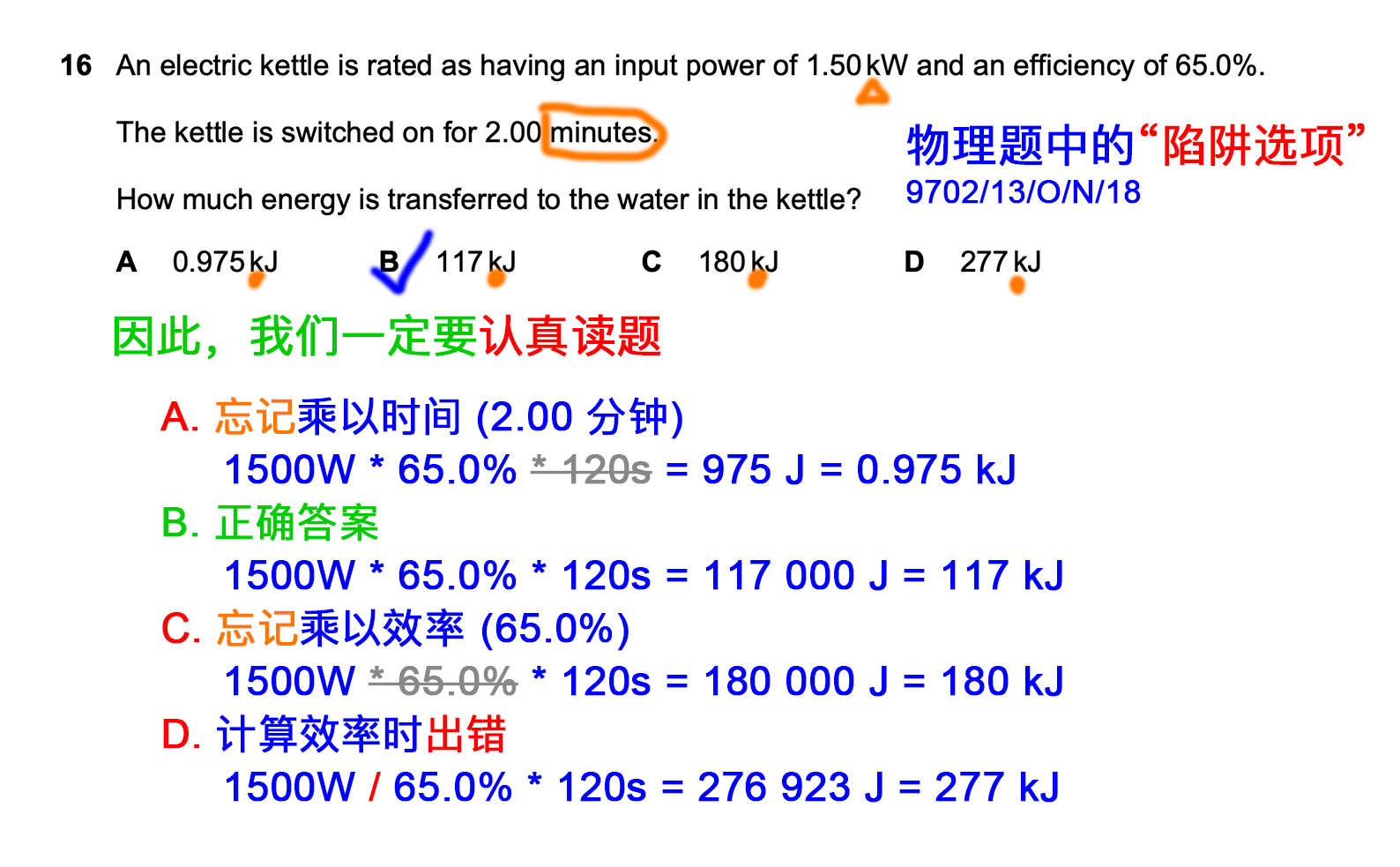
物理选择题“陷阱选项”
2. 保持桌面整洁
其次,同学们要保持桌面整洁✨,给自己的纸质学习资料腾出足够的空间。
在2022年,我想到了理想学习环境假设条件🛠️(灵感来自于“理想气体 (Ideal Gas)💨”,pV=nRT,R=8.31),满足以下所有条件就会达到完美的学习📝效率🌟,例如:
- 1. 有WiFi🔗提供,最低网速💨50 Mbps (6.25 MiB/s)
- 2. 有足够的灯光💡和照明
- 3. 有足够的物品放置空间📦
- 4. 允许✅使用电子设备💻
- 5. 合适的书桌高宽🪧
- 6. 舒适的椅子/沙发🛋️
- 7. 有充电口🔋🔌
- 8. 可以饮食🥙☕️
- 9. 安静🤫,小于70分贝(dB)
- 10. 完全不被分心📵、感到无聊或疲劳😴
- 11. 丰富多彩的装饰🌿
- 12. 能停留很长时间⏳
- 13. 有能放松心情的音乐🎵🎧
- 14. 使用该环境时,不需要额外购买💷物品(如饮品)
- 15. 有时钟🕘或定时器⏳
- 16. (2023年新增) 有同伴压力👨👩👧👧(至少有1个其他人,包括工作人员)
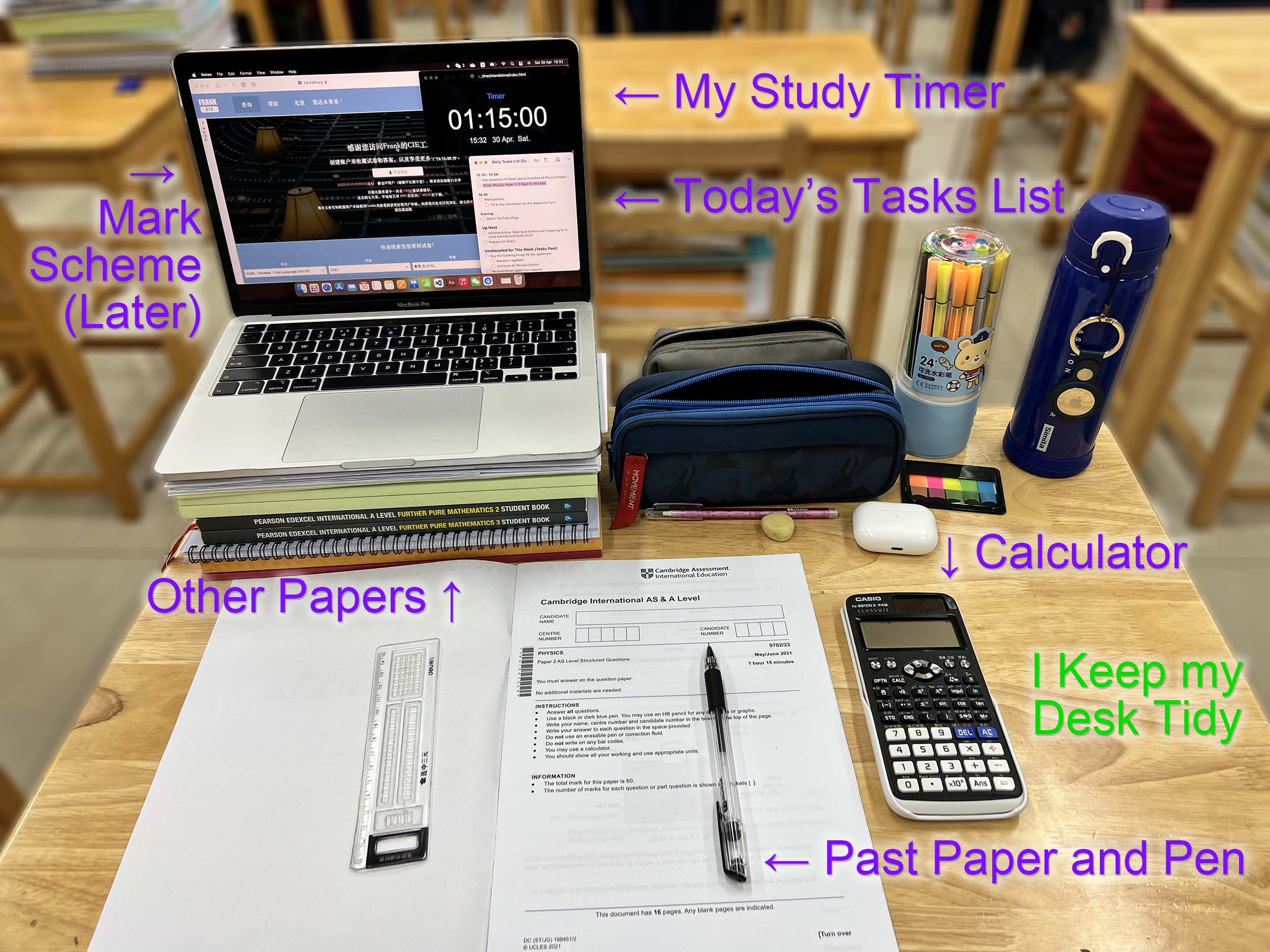
在学校刷国际考真题
3. 不要将太多任务推到截止时间再完成
我建议同学们按时⏳完成🏁任务。无论任务的截止时间📆,你都要完成✅这个任务。
如果你将很多任务推到截止时间📚再完成,你就会匆忙💨完成任务,这样任务的质量就会低一些⬇️,也将无法帮助你提高成绩。
尽早复习📖你的考试学科(尤其是即将到来的考试),因此你将会有足够的时间来复习知识点和积累自己的知识库📚。
减少拖延,不要无故推迟今天要做的任务。当你完成今天的任务后,你会有很大的成就感🏆哦!
我的建议🚦:
请按照正常速度完成任务,
不要匆忙完成/囤积任务,
也不要将太多任务推到截止时间再完成。
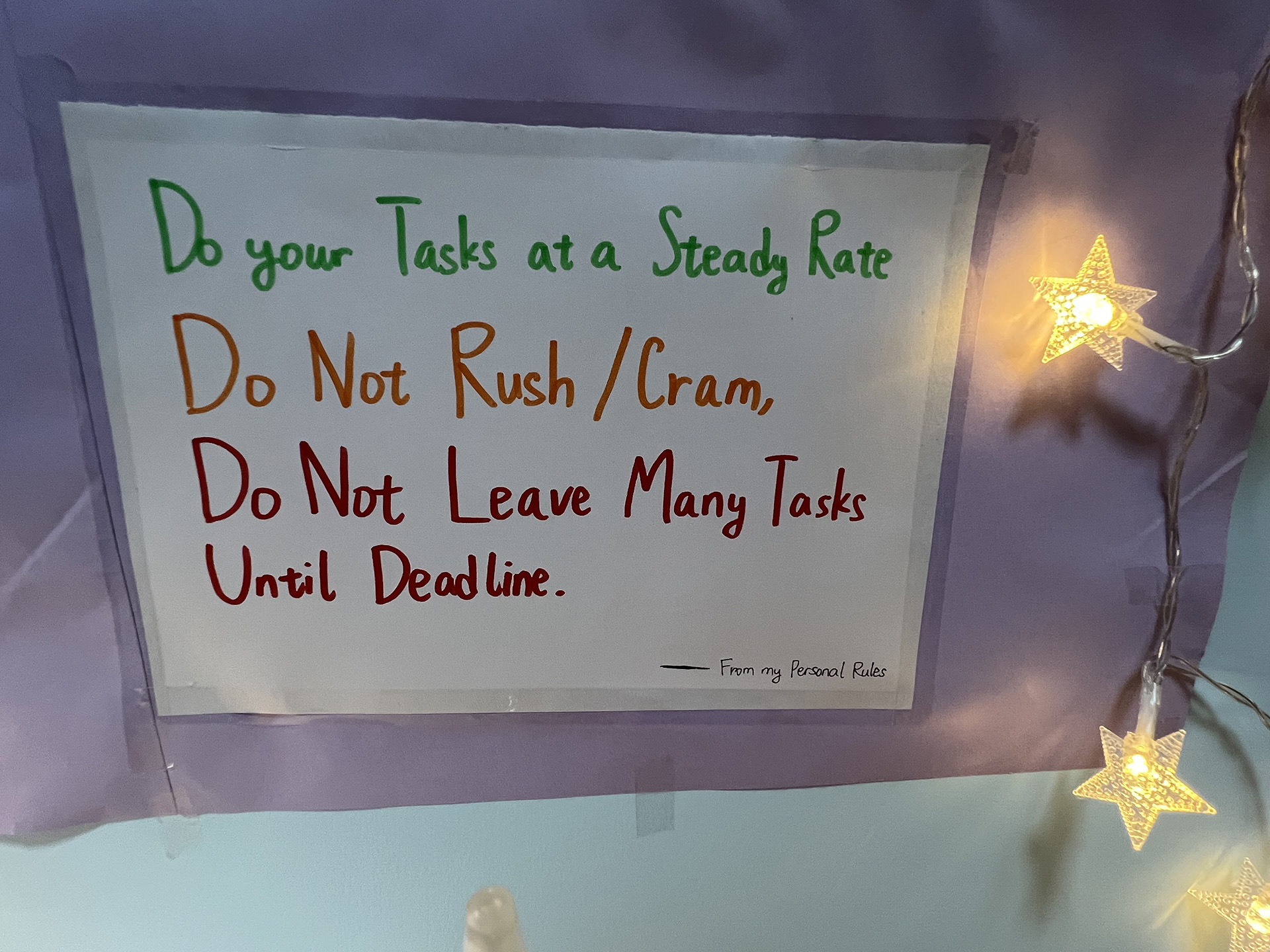
我的房间装饰提醒卡
4. 考试结束后,不要大声讨论答案
我发现有些同学在离开考场后会大声📢跟其他同学👨👩👧👧讨论💬答案。
考试已经结束⌛️了,即使讨论了答案,也无法进行修改✏️。
如在讨论时你的答案错了❌,你不仅会给自己增加心理压力😰,还会影响后续的考试😴。
同学A:你在第6题(a)(i)问回答了什么?我的答案是6 A(安培Ampere,电流单位)。
我:我的答案是6.0 A,因为它应该是2-3位有效数字(s.f.)。
同学A:啊?⚠️我忘记保留有效数位了!
无论你考得怎么样😀,会得到什么成绩🏅,你都要专心准备后续➡️的考试学科和场次。
因此,我在每场考试结束后,都会忘掉考试时填写的答案,就像清空电脑上的内存RAM💾内容一样。
我的复习方法
1. 规划并查看每一场考试
那么我是怎么规划自己的考试场次呢?我会使用我自己编写的Ken的学习规划师工具做计划。
由于我有编程⌨️技能,我编写了这个网站和规划的网页版APP(工具)🖥️,让自己更容易地规划学习旅程🚄。
在考试季中,每一场考试的时间都是离散分布的。因此,我们还需要留意每场考试的日期、学科和试卷编号。
因此,我在该工具中的“事件”🗓️区域中添加了考试场次。
我使用“CAIE学科代码(syllbus code)/试卷编号”作为每场考试的名称,比如说“9709/33 (数学纯数部分)”和“9618/13 (计算机基础知识)”。
我的学习规划软件的一个独特的重要功能🌟就是会显示距离每场考试的剩余天数⏳。
剩余小于7天的考试会变为橙色,小于3天为红色。
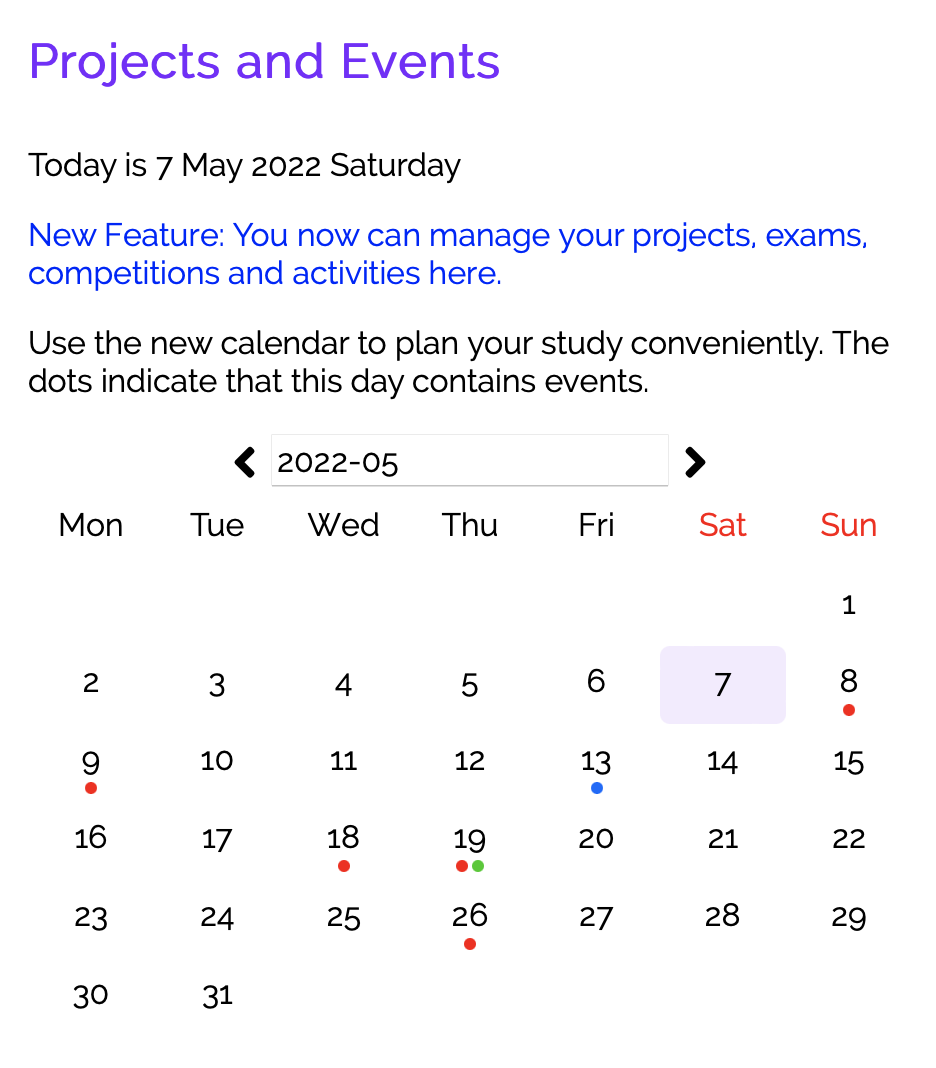
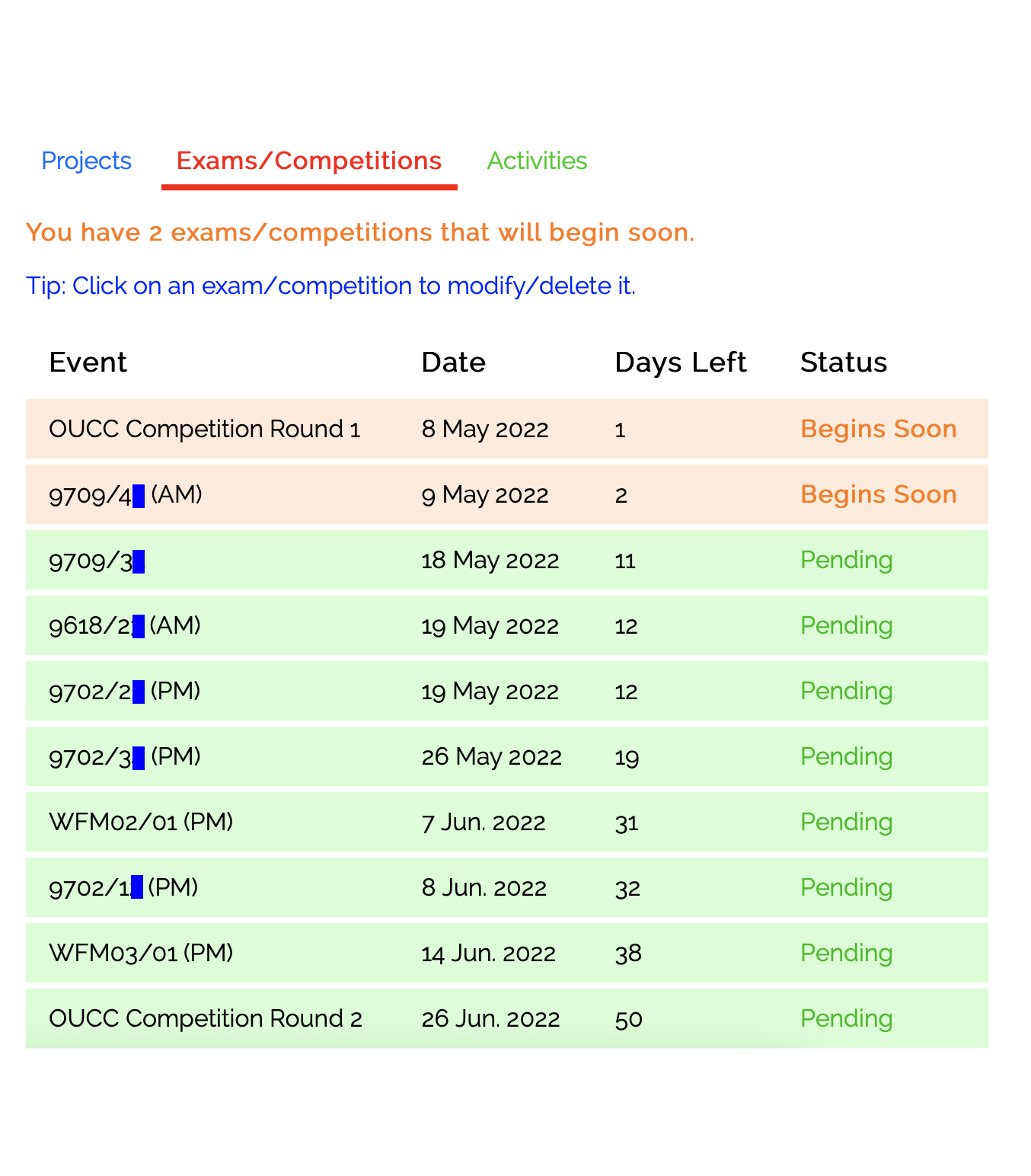
Ken的学习规划师 (2022旧界面)
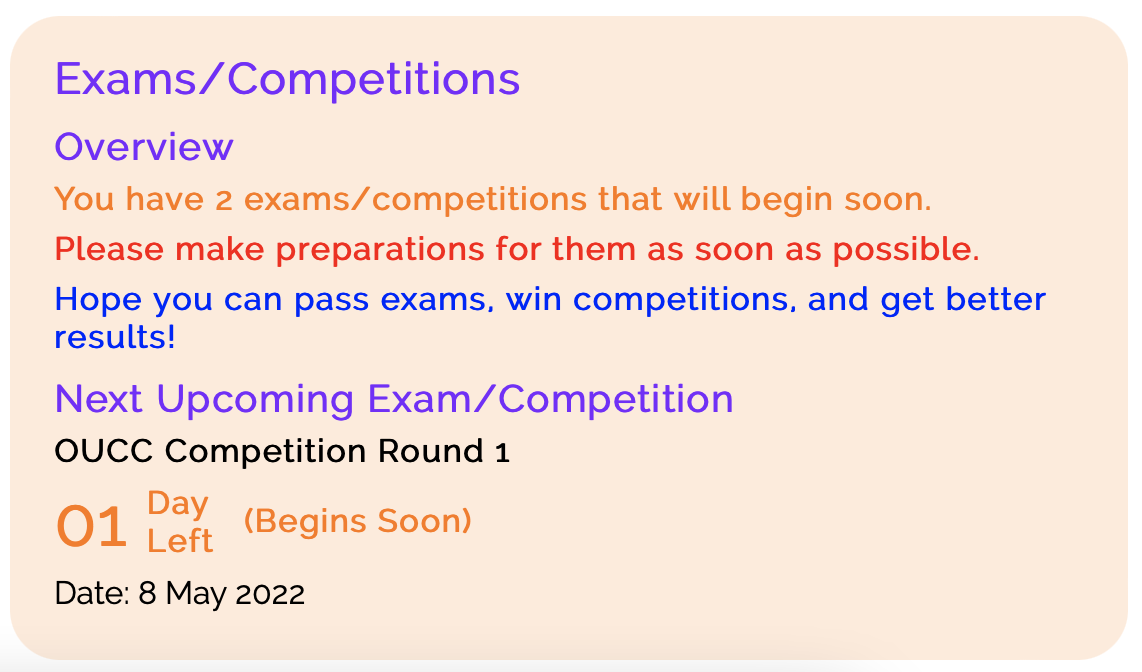
除此之外,如果你在学校中无法使用电子产品📵,你还可以把它们写在一张纸上📄。
Ken的学习规划师工具等我的学习资源🗞️都是免费🤑、非盈利的,你可以注册使用,做好计划🗓️。
我会在空闲时间⏳,利用自己的编程技能⌨️和学科知识🎓帮助其他同学,就像志愿者服务一样。
2. 复习考纲Syllabus
剑桥CAIE的每个学科中都有着考纲syllabus📜,会介绍考哪些知识点🎓。
你可以下载📥并通过考纲来复习🤔每个知识点,并找到自己缺失📚的知识点。
学科的大纲在官网上是可以看到☑️的。你可以在浏览器中输入cambridgeinternational.org/9709(把9709换成自己的学科代码,如9702、9618),向下滚动⬇️,找到并下载大纲的PDF文件。你还可以下载公式表(List of Formulae)、数据表(Data Booklet)等文件哦!
常见CAIE学科代码Syllabus Code(仅供参考):
- 9231: Further Mathematics
- 9618: Computer Science (9608为旧考纲)
- 9700: Biology
- 9701: Chemistry
- 9702: Physics
- 9708: Economics
- 9709: Mathematics
你需要学会如何使用官网🌎,比如说点击菜单和下载文件📥。
比如说,你可以通过我网站顶部⬆️的菜单找到🔍学习资源(例如学习习惯🔄)。
在申请大学🏫时,你也需要这个能力🌟,比如说查看专业入学学科成绩要求(如A*AA)。
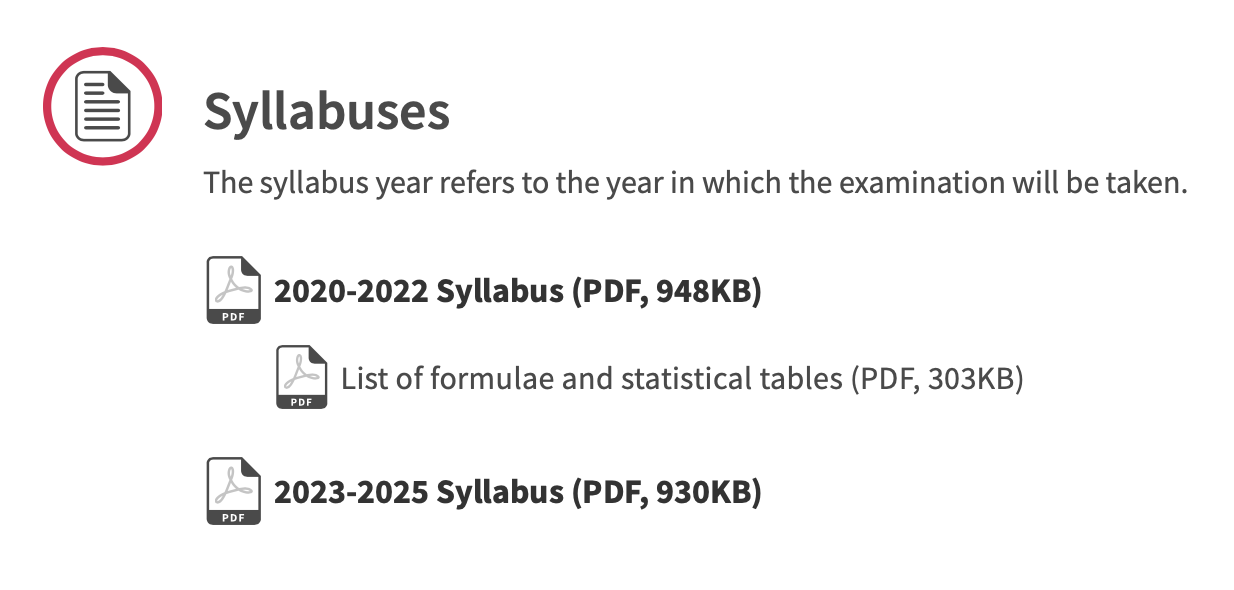
CAIE 9709 考纲下载选项
比如说,计算机 (9618)🖥️考纲会要求同学们掌握抽象Abstraction和问题分解Decomposition。
因此,同学们需要记住💭这些定义definitions📓,以及学习它们的原理🔑。
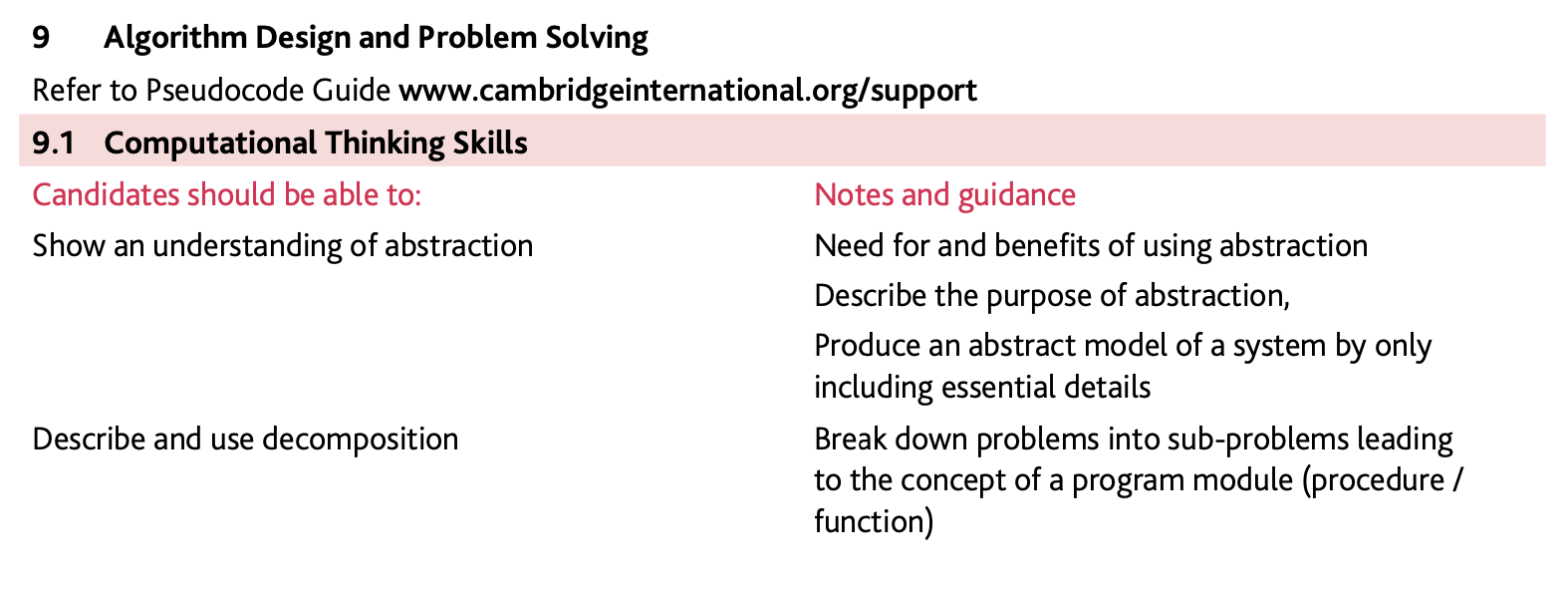
CAIE 9618考纲 第9章
3. 复习缺失的知识点
复习考纲之后,你可以查看课本📖,或者是一些网上的资源🌎,补充缺失的知识点。
比如说上面⬆️的例子,复习之后你将会知道:
- Abstraction is to filter out unnecessary information while only extracting necessary information to solve a problem.
- Decomposition is to break down a big problem into several smaller steps.
4. 刷真题
在有限的时间内刷真题时,还可以让自己沉浸在考试📝的氛围🌿当中。你将会熟悉考试的题型和答题技巧。
我会使用学习计时器⏳来限制刷题时间(取决于每个试卷(paper)的时间限制)。
我自己编写的计时器还会显示现在的时间,因此我不需要切换成时钟模式,就能知道现在的时间。

9618真题时间限制
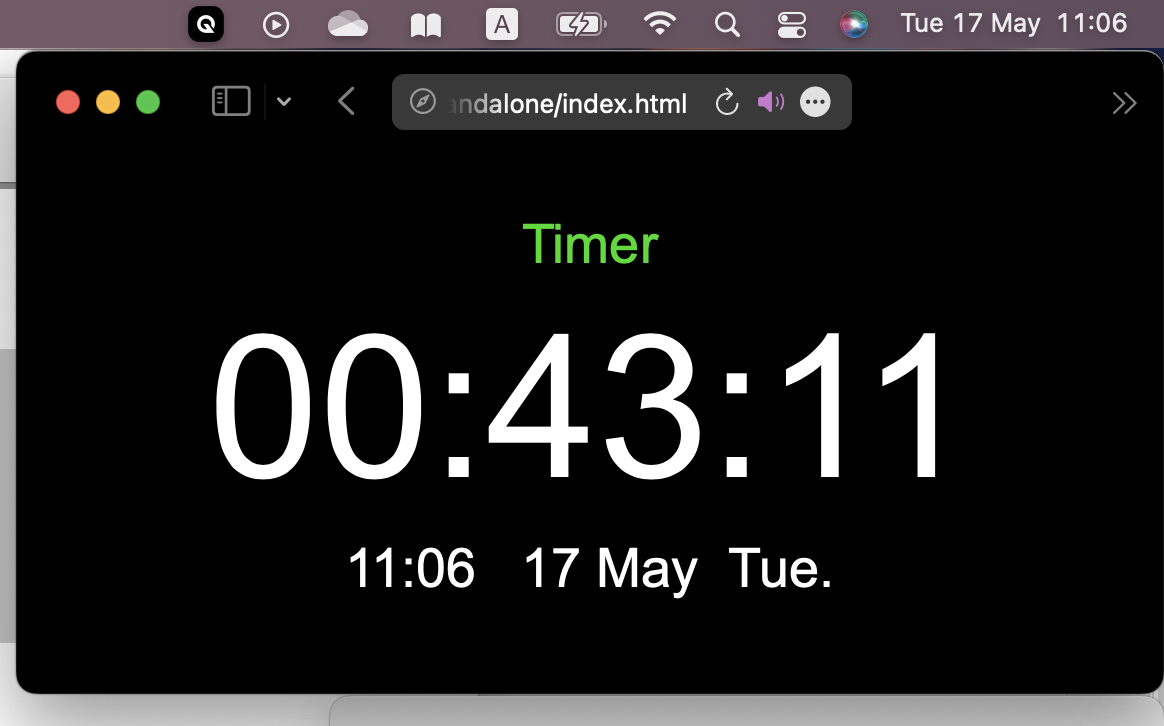
我的学习计时器
如做完题后还有很多时间⏳,你可以休息几分钟,然后从头到尾仔细⚠️阅读📖题目并检查答案。
刷完题后,还要用评分细则Mark Scheme对答案☑️。这样你就会知道试卷是怎么改分💯的,以及哪些答案是考官想要的答案🌟。
比如说,即使你不会做一道题,只要写对了公式(比如说F=ma、I∝A2),就能获得M1方法分✅。
5. 考同学知识点,一起复习
我会在空闲时间🕓考同学学过的知识点。
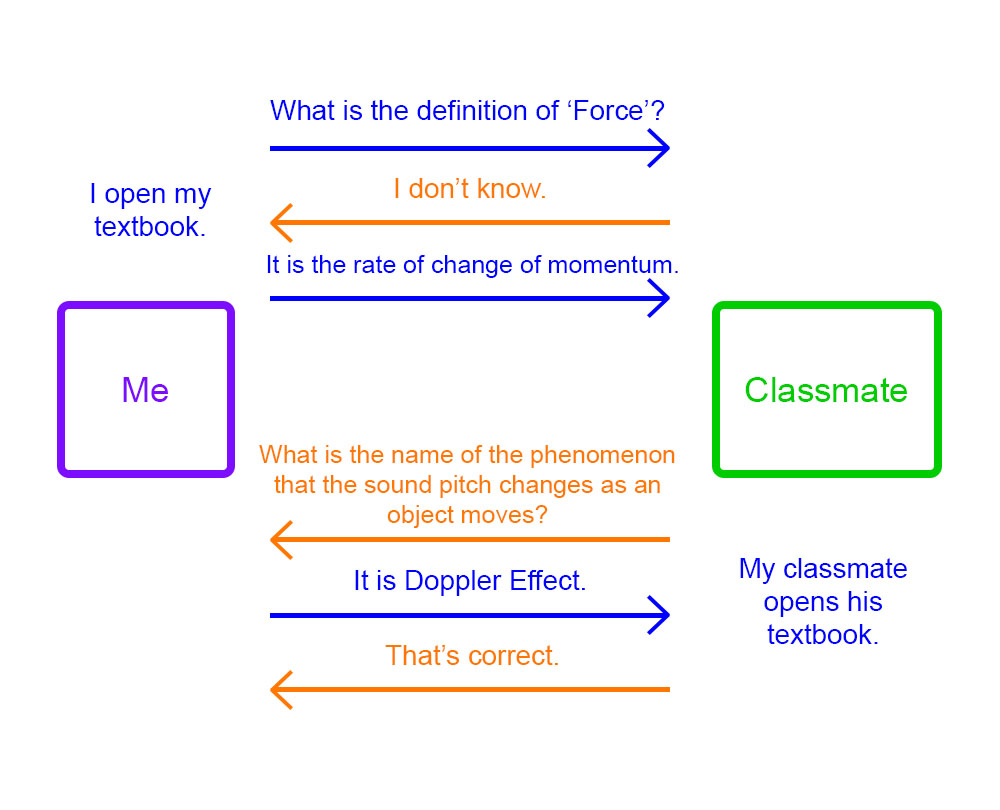
考同学A Level物理 (9702, 样例)
在这个方法的基础上,我还会出一些像考试一样的题目📄,把自己所问的问题写出来考同学。
比如说,由于我是计算机(9618)🖥️的学生,我还出了这些题目来考同学。
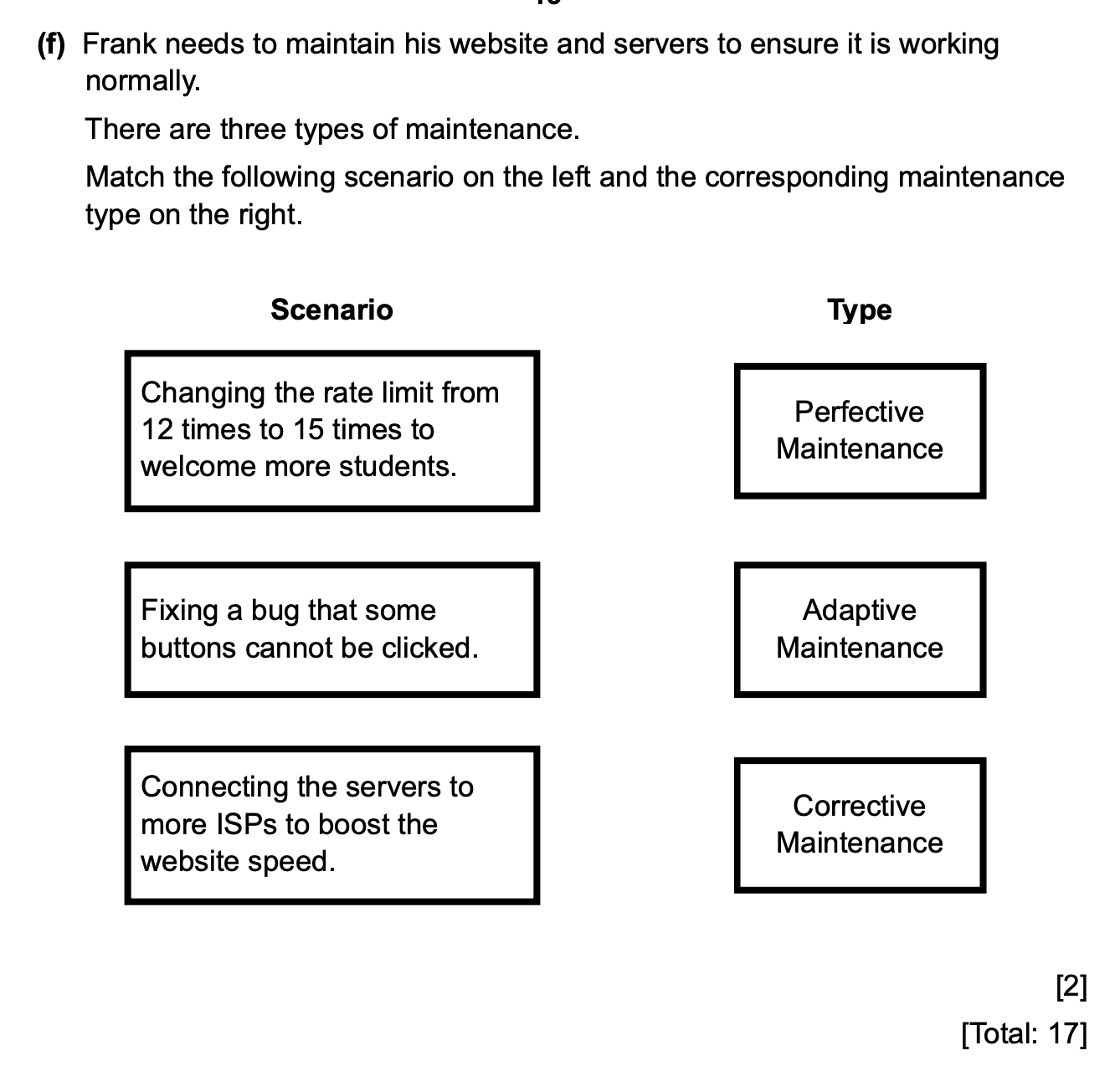
我给同学的AS计算机题目
在2022年,考数学纯数3(9709/P3)的前一天,我还跟一个数学🧮的同学撞了想法(同时有相同的想法),他也出了一道纯数3的题目。
即使自己出的题目和答案不太准确⚠️或正确❌,这也是一个学习的过程🌟。复习时可以纠正✅题目和答案中的错误。
有时,考试中也许会遇到相同的题型,甚至有“押题”的可能。
6. 制作鼓励式背景图片和装饰品
我还制作了能鼓励自己🌟的桌面背景图片🖼️和公寓房间门🚪上面的横幅。
在我的想象中,证书🎖️上A* (A Star)等级中的星星(*)会变成真正的星星,飞到天空☁️上闪闪发光💡,为同学们的成功✅之路增添光彩,鼓励同学们努力学习。
A Level考试中有着很多个等级,从A*、A、B、C、D到E,其中A*是最高等级。
这就是为什么我会说“A*到来,点亮未来”。
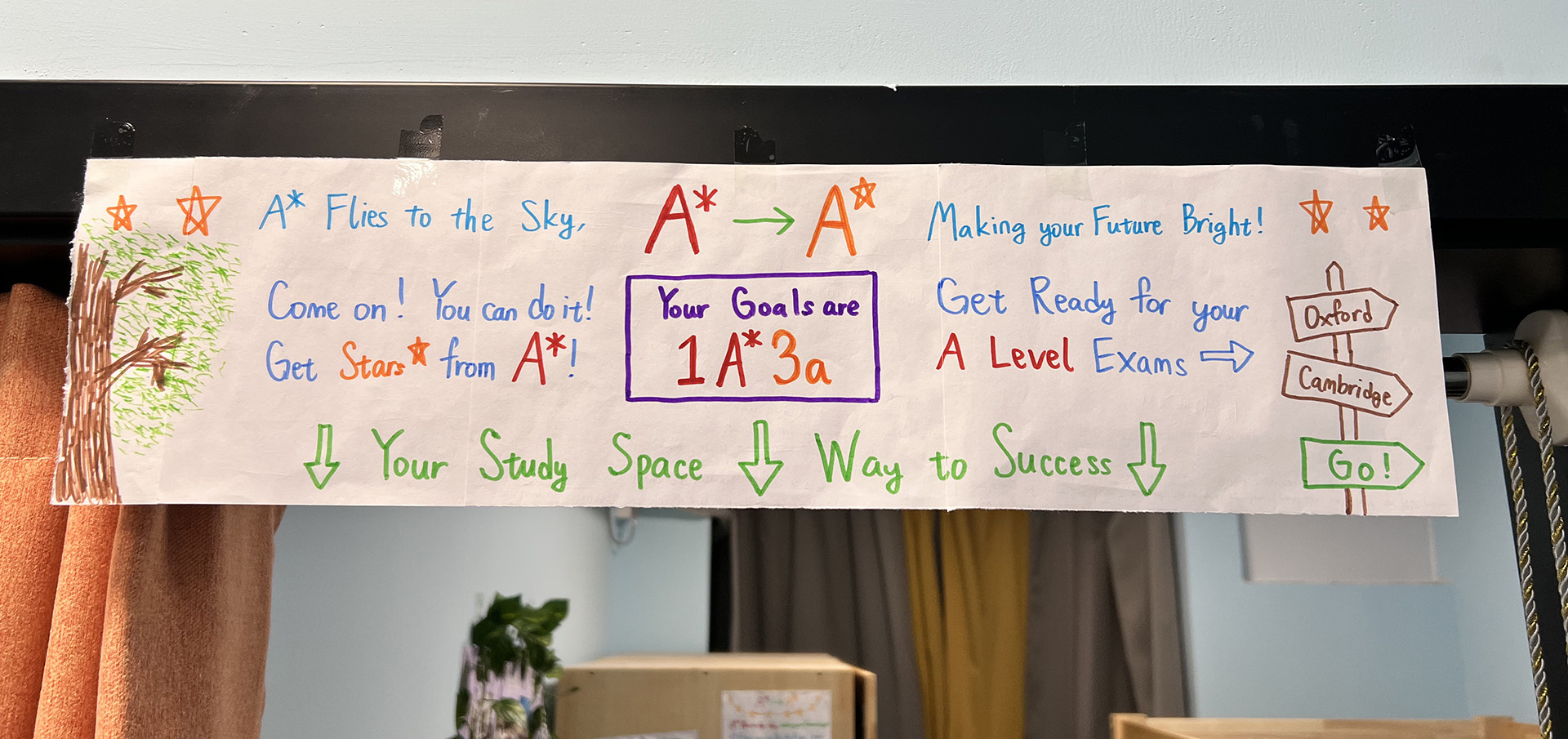
公寓A*考试鼓励横幅 (2022年, AS)
预祝大家考试顺利
A Level国际考即将进行⏳,Ken的学习之旅希望同学们勤奋学习,预祝同学们考试顺利,在国际考中从A*中摘下更多“星星”🌟!加油!



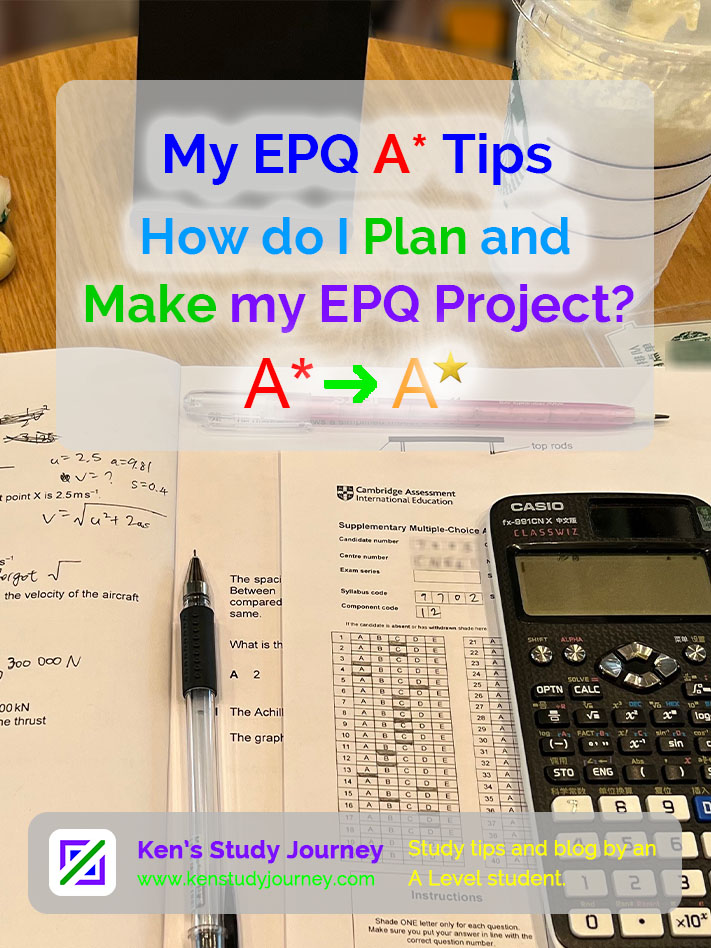
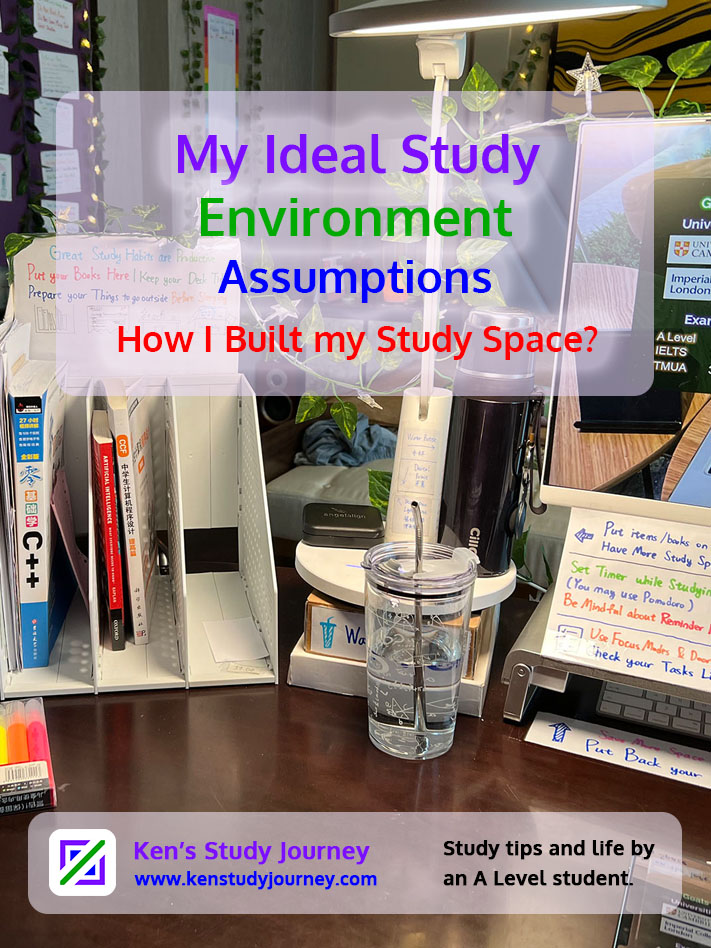

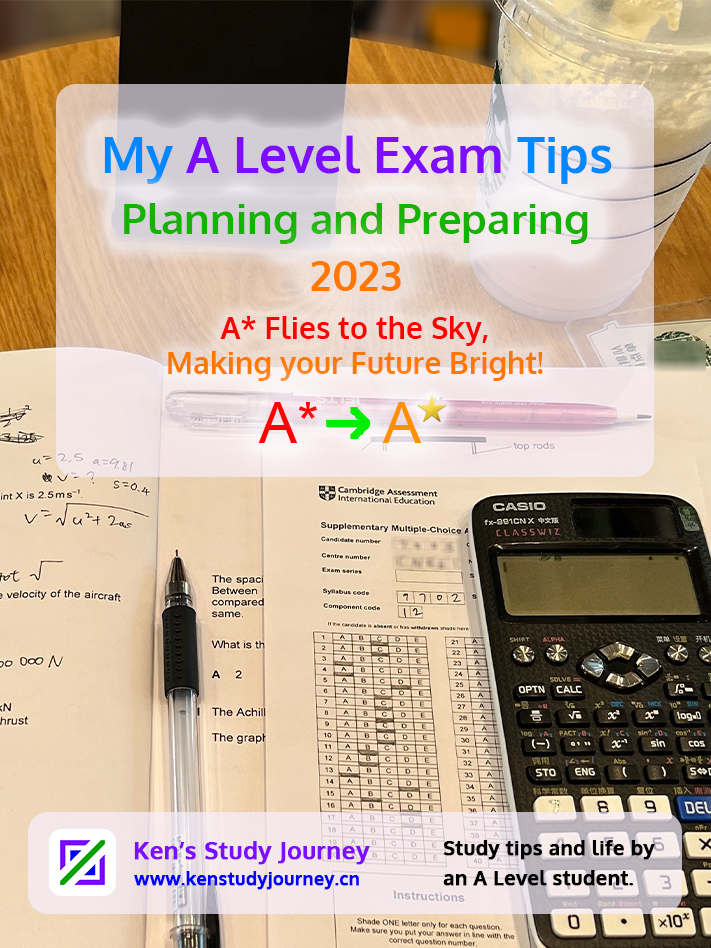

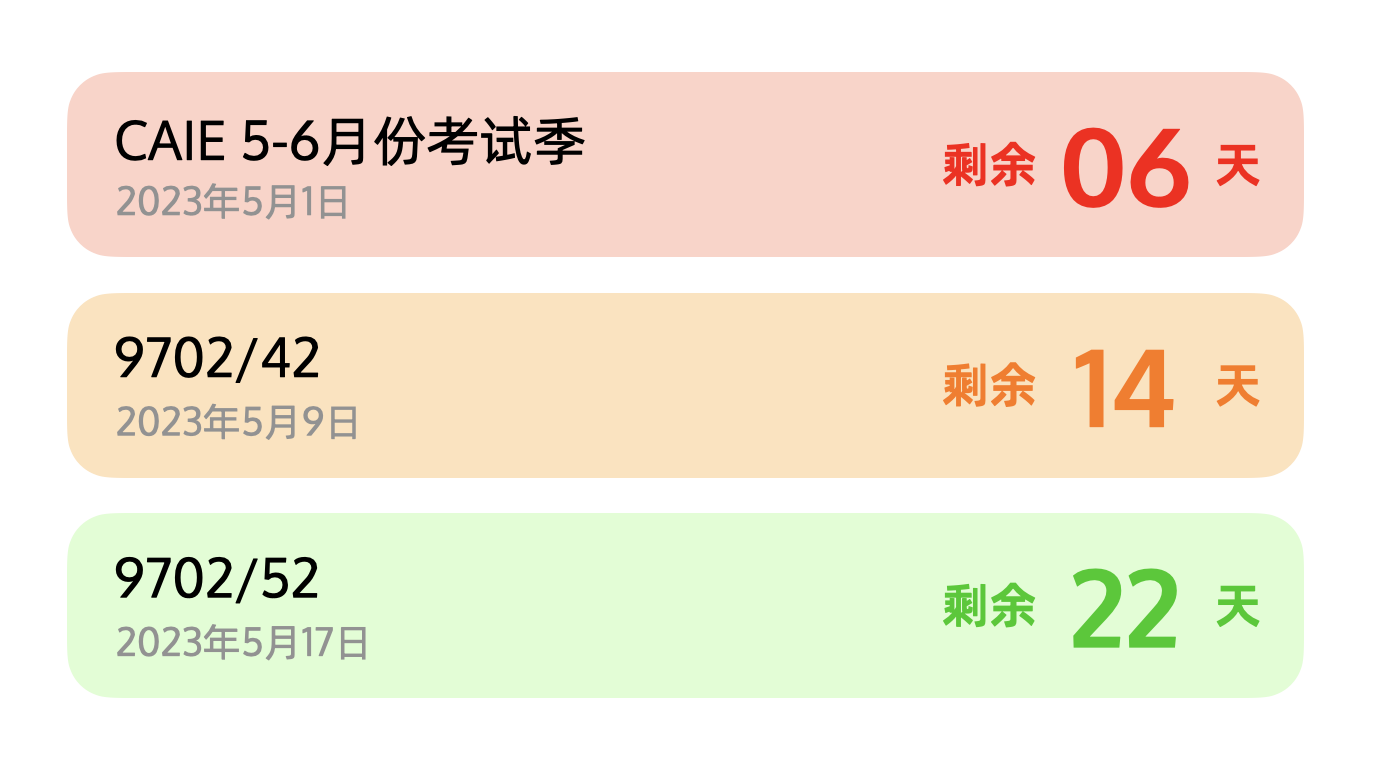
你的评论发送成功,但为了防止垃圾和负面评论,它需要经过我本人的人工审核,才能显示在网站中。
请耐心等待几天,当评论审核通过并被回复时,你将会收到一封邮件。